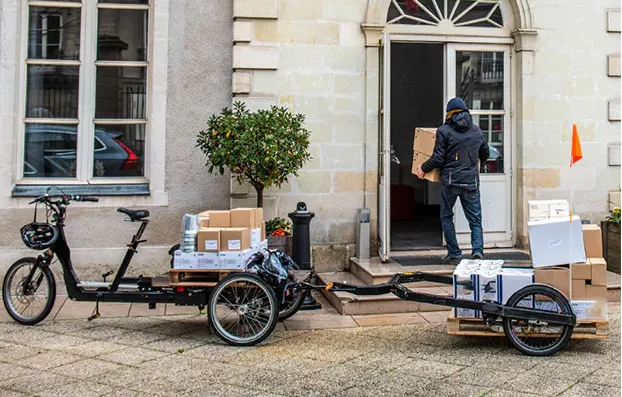
Photo: EIT InnoEnergy
European delivery firms could save €544 million annually with e-cargo bikes
28 March 2024
by Christopher Carey
Mixed electric fleets of e-cargo bikes and e-vans could save urban logistics firms €554 million (US$541 million) annually by 2030, according to a new report from sustainable energy consortium, EIT InnoEnergy.
The study breaks down the cost savings for companies over time, finding that a large logistics firm delivering two billion parcels per year with a mixed fleet of 80 percent e-cargo bikes and 20 percent e-vans could make savings of €554 million annually from 2030, when compared to a 100 percent e-van fleet.
The switch could also reduce last-mile logistics emissions by up to 80 percent.
“Logistics providers today are dealing with many simultaneous challenges: rising parcel volumes, stricter city regulations, and the need to save costs in a low-margin business,” said Jennifer Dungs, Global Head of Mobility, EIT InnoEnergy.
“This study demonstrates that e-cargo bikes are not only a sustainable way to address these challenges, but also cost-competitive and viable for major logistics players – already today, and even more so by 2030.”
Breakdown
In the study’s baseline case, which assumes a delivery fleet with a 60 percent share of e-cargo bikes and 40 percent e-vans operating in a large, densely populated city, the total costs per parcel in 2023 would be €0.05 lower compared to a pure e-van fleet (€1.36 vs. €1.41).
By 2030, that difference on a per parcel base would increase to €0.20. For a large logistics player delivering two billion parcels per year, these cent amounts would translate to bottom line annual savings of around €95 million in 2023 and €390 million by 2030.
In an “optimised scenario” (80 percent e-cargo bikes/20 percent e-vans, operating in a medium-sized city) the figures in relation to a 100 percent e-van fleet would be higher – with an annual saving of €554 million by 2030.
“Importantly, these overall savings in all scenarios occur despite added costs incurred by mixed fleets, which primarily consist of increased personnel costs for parcel sorters at micro fulfilment centres and delivery riders,” the study says.
Emission reduction
The results also indicated that the introduction of e-cargo bikes could reduce emissions from last-mile logistics by up to 80 percent across Europe’s 100 largest cities, while reducing traffic congestion and competition for space by replacing up to 120,000 vans.
Compared to 100 percent e-van fleets, the study shows that mixed fleets reduce pressure on local grids, saving the equivalent of up to 850 households’ annual energy demand per city.
“To harness the potential of mixed fleets, cities and logistics providers have a vested interest in working together,” Dungs added.
“There’s great potential here for the development of public-private partnerships to optimise infrastructure planning, ensuring that the full sustainability, space, and cost-saving benefits are realised.”
Image: EIT InnoEnergy







